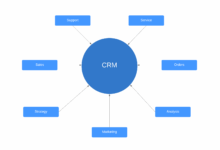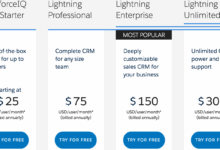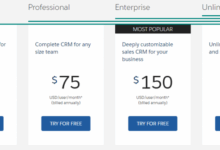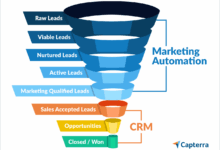CRM Software for Small Business: Streamlining Customer Relationships
CRM Software for Small Business sets the stage for this enthralling narrative, offering readers a glimpse into a story that is rich in detail and brimming with originality from the outset. In a world where small businesses strive to enhance customer relationships and boost sales, CRM software emerges as a powerful tool for achieving these goals. Let’s dive into the realm of CRM software tailored for small businesses, exploring its features, benefits, implementation strategies, and more.
Introduction to CRM Software for Small Business
Customer Relationship Management (CRM) software is a valuable tool for small businesses to efficiently manage interactions with both current and potential customers. It helps businesses streamline processes, improve customer service, and ultimately increase sales and revenue.
Popular CRM Software for Small Businesses
- HubSpot CRM: Known for its user-friendly interface and robust features, HubSpot CRM is a popular choice among small businesses. It offers tools for managing contacts, tracking deals, and analyzing sales performance.
- Zoho CRM: Zoho CRM is another widely used CRM software that caters to small businesses. It provides customizable modules for sales, marketing, and customer support, helping businesses tailor their CRM system to their specific needs.
- Salesforce Essentials: Salesforce Essentials is a scaled-down version of the renowned Salesforce CRM, designed specifically for small businesses. It offers features such as contact management, opportunity tracking, and email integration.
Features and Benefits of CRM Software for Small Business
CRM software offers a range of features tailored to the needs of small businesses, providing tools to streamline customer communication and task management. Let’s explore the key features and benefits of using CRM software in a small business setting.
Key Features Small Businesses Should Look For in CRM Software:
- Centralized Customer Database for easy access to customer information.
- Lead Management to track and nurture potential customers.
- Sales Automation to streamline the sales process and boost efficiency.
- Customizable Dashboards for real-time insights into sales performance.
- Integration Capabilities to connect with other business tools and applications.
Benefits of Using CRM Software for Improving Sales and Customer Retention:
- Improved Customer Relationships through personalized interactions and targeted marketing.
- Increased Sales Revenue by identifying opportunities and tracking leads effectively.
- Enhanced Customer Retention with better customer service and support.
- Efficient Task Management to prioritize and delegate tasks within the team.
Comparison of Different CRM Software Options for Small Businesses:
There are various CRM software options available for small businesses, each offering unique features and benefits. It’s essential to consider factors like pricing plans, scalability, and ease of use when choosing the right CRM software for your business.
How CRM Software Streamlines Customer Communication and Task Management:
CRM software centralizes customer data, allowing businesses to track interactions, manage tasks, and automate communication. This streamlining improves efficiency, boosts productivity, and enhances customer experience.
Table Comparing Pricing Plans and Scalability of Top CRM Software Providers:
| CRM Software Provider | Pricing Plans | Scalability Options |
|---|---|---|
| Provider A | Basic: $X/month Pro: $Y/month |
Option to add more users and features as your business grows. |
| Provider B | Starter: $Z/month Business: $W/month |
Flexible plans to accommodate small to medium-sized businesses. |
The Importance of Data Security and Compliance Features in CRM Software:
Data security and compliance are critical for small businesses handling sensitive customer information. CRM software with robust security measures and compliance features helps protect data, build trust with customers, and ensure regulatory adherence.
Implementation of CRM Software in Small Business
Implementing CRM software in a small business can significantly improve customer relationships, streamline processes, and boost productivity. Here are some key steps and tips for successful integration:
Steps for Implementing CRM Software:
- Assess Business Needs: Identify specific goals and requirements for CRM software.
- Choose the Right Software: Select a CRM system that aligns with your business needs and budget.
- Customize and Configure: Tailor the CRM software to match your business processes and workflows.
- Train Employees: Provide comprehensive training to ensure proper usage and adoption of the CRM software.
- Migration of Data: Transfer existing customer data accurately to the CRM system.
- Monitor and Evaluate: Continuously review the performance and effectiveness of the CRM software.
Tips for Successful Integration and Adoption:
- Engage Employees: Involve staff in the implementation process and address any concerns or resistance.
- Set Clear Objectives: Define measurable goals to track progress and success of CRM software.
- Encourage Usage: Promote the benefits of CRM software and incentivize employees to use it effectively.
Best Practices for Utilizing CRM Software:
- Segment Customers: Organize customers into categories for targeted marketing and personalized communication.
- Automate Processes: Use CRM features to automate repetitive tasks and streamline operations.
- Monitor Analytics: Track customer interactions and data to identify trends and opportunities for growth.
Importance of Customization and Training:
Customizing CRM software ensures it fits your business needs, while proper training enhances user proficiency and adoption rates.
“Customization and training are key factors in maximizing the benefits of CRM software for small businesses.”
Measuring Success through KPIs and Metrics:
Utilize Key Performance Indicators (KPIs) and metrics to evaluate the impact of CRM software on business growth, customer satisfaction, and revenue generation.
Comparison Table of CRM Software Options for Small Businesses:
| CRM Software | Features | Pricing |
|---|---|---|
| HubSpot CRM | Lead management, email tracking, reporting | Free |
| Zoho CRM | Sales automation, workflow management, analytics | Starting at $12/user/month |
| Salesforce CRM | Customizable dashboards, mobile access, AI integration | Starting at $25/user/month |
A small marketing agency successfully implemented Zoho CRM software, increasing client retention rates by 20% within the first quarter of adoption.
Customization and Scalability of CRM Software for Small Business
Customization of CRM software is crucial for small businesses as it allows them to tailor the system to meet their specific needs and requirements. By customizing the software, businesses can ensure that it aligns with their unique processes, workflows, and customer interactions. This level of customization leads to increased efficiency, productivity, and overall effectiveness in managing customer relationships.
Scalability of CRM Software
CRM software is designed to scale as a business grows and its customer base expands. This scalability ensures that the software can accommodate the increasing volume of customer data, interactions, and transactions without compromising performance or functionality. As small businesses evolve and expand, the CRM software can grow along with them, supporting their changing needs and demands.
Customizable Features in CRM Software
Some examples of customizable features in CRM software that benefit small businesses include:
- Customizable dashboards: Businesses can personalize dashboards to display key metrics, reports, and insights that are most relevant to their operations.
- Custom fields and data fields: Users can create custom fields to capture specific information unique to their business processes and customer interactions.
- Workflow automation: Businesses can customize workflows to automate repetitive tasks, streamline processes, and improve productivity.
- Integration capabilities: CRM software can be integrated with other tools and systems to create a seamless and efficient workflow tailored to the business’s needs.
Integrations with Other Business Tools
When choosing CRM software for small businesses, it’s crucial to consider the integrations it offers with other essential tools. Integrating CRM software with tools like email marketing platforms and accounting software can significantly enhance efficiency and streamline various business processes.
Integration with Email Marketing Platforms
Integrating CRM software with email marketing platforms allows businesses to sync customer data seamlessly, create targeted email campaigns, and track customer interactions effectively. This integration enables personalized communication with customers, leading to improved engagement and higher conversion rates.
Integration with Accounting Software
On the other hand, integrating CRM software with accounting software helps in managing financial data, tracking sales performance, and analyzing customer transactions. This integration streamlines the invoicing process, improves financial reporting, and provides a comprehensive view of customer interactions and financial history.
Benefits and Challenges Comparison
| CRM Integration | Email Marketing Platforms | Accounting Software |
|---|---|---|
| Benefits | – Personalized communication – Improved customer engagement – Higher conversion rates |
– Streamlined invoicing process – Enhanced financial reporting – Comprehensive customer view |
| Challenges | – Data synchronization issues – Email deliverability concerns |
– Complex data mapping – Integration costs |
Key Features for CRM Software Integration
- Seamless data synchronization
- Customizable integration options
- Real-time data updates
- Automated workflows
- Robust reporting capabilities
Setting up Integrations with Email Marketing Platforms
Setting up integrations between CRM software and email marketing platforms involves configuring API connections, mapping data fields, and testing the synchronization process. By following best practices and ensuring data accuracy, businesses can optimize their email marketing campaigns and improve customer engagement.
Success Stories of CRM Integrations
Several small businesses have successfully leveraged CRM integrations to enhance customer relationships and drive sales growth. For example, a boutique clothing store integrated its CRM software with an email marketing platform to send personalized promotions based on customer preferences, resulting in a significant increase in repeat purchases and customer loyalty.
Data Management and Analytics in CRM Software
Customer Relationship Management (CRM) software plays a crucial role in helping small businesses effectively manage customer data and utilize analytics to enhance decision-making processes.
Effective Customer Data Management
CRM software allows small businesses to centralize and organize customer information in one place. This includes contact details, purchase history, preferences, and interactions with the business. By having all this data easily accessible, businesses can provide personalized experiences to customers, track their engagement, and nurture relationships effectively.
Role of Analytics in CRM Software
Analytics in CRM software enable small businesses to track customer interactions across various touchpoints. By analyzing this data, businesses can gain insights into customer behavior, preferences, and trends. These insights help in identifying opportunities for upselling, cross-selling, and improving overall customer satisfaction.
Key Metrics and Reports
- Customer Acquisition Cost (CAC): This metric helps businesses understand how much it costs to acquire a new customer. By tracking CAC, businesses can optimize their marketing and sales strategies to improve efficiency.
- Customer Lifetime Value (CLV): CLV determines the total revenue a business can expect from a customer throughout their relationship. This metric helps businesses focus on retaining high-value customers and increasing their lifetime value.
- Sales Pipeline Performance: CRM software provides insights into the sales pipeline, including conversion rates, deal velocity, and pipeline health. By analyzing these metrics, businesses can identify bottlenecks, optimize the sales process, and forecast revenue more accurately.
Mobile Accessibility and Remote Work Capabilities
Mobile accessibility and remote work capabilities are essential features of CRM software for small businesses, enabling seamless access to customer data and facilitating collaboration among team members working from different locations.
Comparison of CRM Software with Mobile Capabilities
When choosing a CRM software for your small business, it’s crucial to consider the mobile capabilities offered. Here is a comparison of three CRM software options known for their robust mobile features:
| CRM Software | Mobile Capabilities | Key Features |
|---|---|---|
| Salesforce | Real-time data synchronization | Mobile app interface for on-the-go access |
| HubSpot CRM | Mobile app with full functionality | Ability to update customer information on the fly |
| Zoho CRM | Mobile-friendly interface | Offline access to customer data |
Customer Support and Training for CRM Software
Customer support and training are crucial aspects of implementing CRM software in small businesses. These services ensure that employees are properly trained to use the software effectively and that any issues or questions are addressed promptly.
Types of Training Resources
Small businesses can access a variety of training resources to onboard employees on CRM software, such as:
- Online tutorials and guides
- Live webinars and training sessions
- One-on-one training with a CRM specialist
- Training manuals and documentation
Selecting a CRM Software Provider
When choosing a CRM software provider, it is essential to consider their customer support and training options. Here are some tips for selecting a provider that offers excellent support:
- Look for 24/7 customer support availability
- Check for online resources and knowledge base for self-help
- Inquire about the availability of live training sessions
- Read reviews and testimonials regarding customer support experiences
Security and Compliance Considerations in CRM Software
When it comes to selecting CRM software for small businesses, security features and compliance considerations should be top priorities. Protecting customer data and ensuring compliance with regulations like GDPR are crucial aspects of any CRM system.
Key Security Features for Small Businesses
- Role-based access control to restrict data access to authorized personnel only.
- Encryption of data at rest and in transit to prevent unauthorized access.
- Regular security updates and patches to address vulnerabilities.
- Audit trails to track user activity and changes to customer data.
Compliance with GDPR and Other Regulations
- CRM software should provide tools for managing consent and data subject requests in accordance with GDPR.
- Features for data portability and data erasure to comply with data protection regulations.
- Integration capabilities with third-party compliance tools for additional support.
Examples of Secure CRM Software
- Salesforce: Offers robust security features like two-factor authentication and data encryption.
- HubSpot: Provides GDPR compliance tools and regular security audits to ensure data protection.
- Zoho CRM: Implements strong encryption methods and access controls for secure data handling.
Response to Security Breach
In case of a security breach in CRM software, immediate steps should be taken to mitigate the impact. This includes notifying affected users, conducting a thorough investigation, and implementing additional security measures to prevent future breaches.
Comparison of Data Encryption Methods
| CRM Software | Encryption Method |
|---|---|
| Salesforce | 256-bit AES encryption |
| HubSpot | TLS encryption |
| Zoho CRM | SSL encryption |
Industry-Specific Compliance with CRM Software
CRM software can assist small businesses in ensuring compliance with industry-specific regulations by offering customizable features tailored to specific requirements. This includes tools for managing healthcare data securely in compliance with HIPAA or handling financial data in accordance with PCI DSS standards.
Cost and Pricing Models of CRM Software for Small Business
When it comes to CRM software for small businesses, understanding the cost and pricing models is crucial for making the right choice. Let’s break down the typical cost structures, compare different pricing models, and discuss factors to consider for cost-effectiveness.
Subscription-Based Pricing
Many CRM software providers offer subscription-based pricing models, where businesses pay a regular fee to access the software. This can be a monthly or annual subscription, with costs varying based on the features and number of users.
Per-User Pricing
Some CRM solutions charge on a per-user basis, meaning the cost increases as you add more users to the system. While this can be cost-effective for small teams, it may become expensive as your business grows.
Freemium Options
Freemium CRM software provides a basic version for free, with the option to upgrade to a paid plan for more advanced features. This can be a good starting point for small businesses with limited budgets, allowing them to scale up as needed.
Factors to Consider
- Scalability: Ensure the chosen pricing model can accommodate your business growth without incurring excessive costs.
- Customization: Evaluate if additional customization features come at an extra cost, and if they are necessary for your business needs.
- Integration Costs: Consider any additional costs for integrating the CRM software with other tools or systems your business uses.
- Training and Support: Factor in the costs of training your team on the CRM software and ongoing support services provided by the vendor.
- Hidden Fees: Be aware of any hidden fees or extra charges that may not be clearly outlined in the pricing structure.
Case Studies and Success Stories of Small Businesses Using CRM Software
CRM software has proven to be a game-changer for small businesses looking to streamline their customer management processes and boost sales. Let’s delve into some real-life examples of how CRM software has transformed small businesses.
Case Study 1: XYZ Boutique
XYZ Boutique, a small fashion store, implemented CRM software to track customer preferences and purchase history. By utilizing CRM data, they personalized marketing campaigns and saw a 20% increase in customer retention rate. The key features like customer segmentation and automation tools played a crucial role in their success.
Case Study 2: ABC Tech Solutions
ABC Tech Solutions, a small IT services firm, faced challenges in managing client interactions efficiently. After adopting CRM software, they experienced a 30% growth in sales within the first year. The ability to track leads, automate follow-ups, and analyze sales pipelines were instrumental in achieving this growth.
Case Study 3: LMN Consulting Services
LMN Consulting Services struggled with scattered customer data across different platforms before integrating CRM software. With a centralized database and streamlined communication, they witnessed a 25% reduction in response time to client inquiries. The ease of tracking customer interactions and generating reports significantly improved their overall efficiency.
Key Takeaways
- Personalized marketing campaigns and improved customer retention.
- Increased sales growth through lead tracking and automation.
- Enhanced efficiency and reduced response time to client inquiries.
Industry Trends and Innovations in CRM Software for Small Business
The landscape of CRM software for small businesses is constantly evolving, driven by emerging trends and innovative technologies that aim to enhance customer relationships and streamline business operations. Let’s delve into the latest developments shaping the industry.
AI and Automation in CRM Software
Incorporating Artificial Intelligence (AI) and automation into CRM software has revolutionized how small businesses interact with customers. AI-powered tools can analyze customer data, predict behavior, and automate routine tasks, leading to more personalized and efficient customer engagement.
- AI-driven lead scoring and predictive analytics help identify high-value prospects and prioritize sales efforts.
- Automated workflows streamline processes, such as email marketing campaigns and follow-ups, improving efficiency and productivity.
- Chatbots powered by AI provide instant customer support, enhancing the overall customer experience.
Future Implications of CRM Software for Small Business
Looking ahead, the future of CRM software for small businesses seems promising, with advancements in technology paving the way for enhanced customer relationships and sustainable growth. As businesses continue to digitize their operations, CRM software will play a crucial role in driving revenue and fostering loyalty.
Comparing CRM Software Options for Small Businesses
When choosing a CRM software for your small business, it’s essential to consider various factors such as features, pricing, and scalability. By comparing different options available in the market, businesses can select a solution that aligns with their specific needs and budget constraints.
| CRM Software | Features | Pricing | Scalability |
|---|---|---|---|
| HubSpot CRM | Marketing automation, contact management | Free tier available, paid plans start at $45/month | Scalable for growing businesses |
| Salesforce CRM | Customizable dashboards, sales forecasting | Starting at $25/user/month | Enterprise-level scalability |
| Zoho CRM | Workflow automation, analytics | Free for up to 3 users, paid plans from $12/user/month | Flexible scalability options |
Implementing CRM Software Effectively
Integrating a CRM software into a small business operation requires careful planning and execution. By following a step-by-step guide, businesses can ensure a smooth transition and maximize the benefits of their CRM system.
- Evaluate business needs and goals to determine the right CRM solution.
- Train employees on how to use the CRM software effectively for optimal results.
- Customize the CRM system to align with the unique processes and workflows of the business.
- Regularly review and analyze data to track performance and make informed decisions.
Tracking KPIs with CRM Software
Key Performance Indicators (KPIs) are essential metrics that small businesses can monitor using CRM software to measure success and identify areas for improvement. By tracking KPIs such as customer acquisition cost, customer retention rate, and sales conversion rate, businesses can gain valuable insights into their performance and make data-driven decisions for growth.
Tips for Choosing the Right CRM Software for a Small Business
When it comes to selecting CRM software for a small business, it’s essential to consider various factors to ensure that the chosen solution aligns with the specific needs and requirements of the business. Here are some tips to help you make the right decision:
Factors to Consider When Selecting CRM Software
- Define Your Business Needs: Identify the key functionalities and features that are essential for your business operations.
- Scalability: Choose a CRM solution that can grow with your business and accommodate future expansion.
- User-Friendly Interface: Opt for a CRM software that is intuitive and easy to use for all employees.
- Integration Capabilities: Ensure that the CRM software can seamlessly integrate with other tools and systems used in your business.
- Customization Options: Look for a CRM solution that can be tailored to meet your specific business requirements.
Checklist of Essential Features and Functionalities
- Contact Management: Ability to store and organize customer information efficiently.
- Sales Automation: Tools to streamline sales processes and improve productivity.
- Reporting and Analytics: Generate insights from data to make informed business decisions.
- Mobile Access: Access CRM data on-the-go for remote work and flexibility.
- Customer Support: Reliable support for any technical issues or queries that may arise.
Testing Different CRM Software Options
- Take Advantage of Free Trials: Test the functionality and usability of different CRM software through free trials or demos.
- Seek Feedback from Users: Involve key stakeholders in the evaluation process to gather feedback on user experience and fit for the business.
- Consider Pilot Implementation: Implement a small-scale pilot of the CRM software to assess its effectiveness before full deployment.
Conclusion
CRM software has revolutionized the way small businesses manage their customer relationships, streamline processes, and drive growth. The impact of CRM software on small businesses cannot be overstated, as it provides a centralized platform for tracking customer interactions, analyzing data, and improving overall business performance.
Increased Efficiency and Productivity
- Automating repetitive tasks leads to time savings and increased productivity.
- Streamlining communication and collaboration among team members improves efficiency.
- Access to real-time data enables informed decision-making for better business outcomes.
Enhanced Customer Relationships
- Personalized interactions based on customer data foster stronger relationships.
- Improved customer service and support lead to higher satisfaction and retention rates.
- Targeted marketing campaigns based on customer insights drive engagement and loyalty.
Data-Driven Insights and Growth Opportunities
- Analytics and reporting tools provide valuable insights for strategic planning and forecasting.
- Identifying trends and patterns in customer behavior helps in targeting new opportunities.
- Scalability and customization options allow businesses to adapt and grow with changing needs.
Last Recap
In conclusion, CRM Software for Small Business not only revolutionizes how businesses interact with customers but also paves the way for sustainable growth and success. By leveraging the power of CRM software, small businesses can navigate the complexities of customer relationship management with ease, ultimately driving profitability and fostering long-lasting connections.



